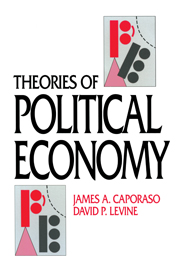Book contents
- Frontmatter
- Contents
- Preface
- Theories of political economy
- Introduction
- 1 Politics and economics
- 2 The classical approach
- 3 Marxian political economy
- 4 Neoclassical political economy
- 5 Keynesian political economy
- 6 Economic approaches to politics
- 7 Power-centered approaches to political economy
- 8 State-centered approaches to political economy
- 9 Justice-centered theories
- Conclusion
- Bibliography
- Index
9 - Justice-centered theories
Published online by Cambridge University Press: 05 June 2012
- Frontmatter
- Contents
- Preface
- Theories of political economy
- Introduction
- 1 Politics and economics
- 2 The classical approach
- 3 Marxian political economy
- 4 Neoclassical political economy
- 5 Keynesian political economy
- 6 Economic approaches to politics
- 7 Power-centered approaches to political economy
- 8 State-centered approaches to political economy
- 9 Justice-centered theories
- Conclusion
- Bibliography
- Index
Summary
One definition of economics ties it to the market. In so doing, it makes the notions of property rights definitive of economic action. This notion demarcates the economy, distinguishing it from the other spheres of social life, including the political. If we attempt to address the problems of political economy on this basis, we do so by exploring the nature, specification, and limits of property rights.
The concept of justice refers to social ordering principles we can use to define rights (including property rights) and the market system. These principles follow from an idea of personhood, especially of the integrity of persons. Justice-centered theories of political economy judge market institutions against the demands of personhood. But, these demands vary for differing conceptions. In particular, the demands of personhood vary with the concreteness and richness of the idea of the person advanced in the different justice-centered theories. Some theories define personhood at the most abstract level, virtually identifying it with the purely formal condition of legal personality. The person is the legally recognized locus of property ownership and capacity to contract. Other theories define personhood in more concrete terms, identifying the capacities that underlie legal personality with varying degrees of richness. In this chapter, we consider a set of justice-centered approaches. We begin with those insisting on the most formal, and least concretized, notion, and proceed to theories incorporating a more determinate idea of personal integrity.
- Type
- Chapter
- Information
- Theories of Political Economy , pp. 197 - 216Publisher: Cambridge University PressPrint publication year: 1992

